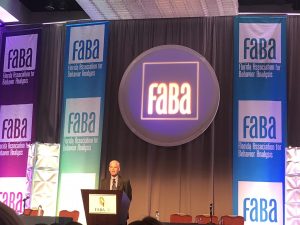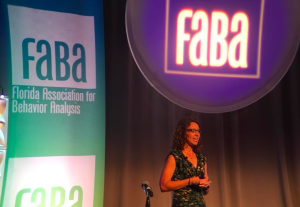
As expected, this year’s FABA conference had many interesting speakers and provided a wonderful opportunity to catch up with colleagues and learn about the interesting work conducted by researchers and practitioners in our field. For a regional conference, FABA is huge. There were 1,500 people registered this year. The excitement and energy was contagious. For those of you who did not attend but like to keep up with developments in our science, I would like to offer some highlights of the conference.
Verbal behavior and RFT

Can’t we all just get along? That was basically the question posed by Dr. Mark Sundberg. In his talk, Dr. Sundberg explained that verbal behavior (VB) and relational frame theory (RFT) accounts of language differ in their functional unit of analysis. For VB, the unit is molecular — verbal operants (e.g., tacts, mands). For RFT, the unit is molar — relational frames (e.g., frame of coordination). Without the basic molecular units, he argued, there can be no complex relational frames. In addition, the verbal behavior perspective can account for complex generative language learning via bidirectional naming.
VB vs. RFT. Why do we have to pick one? According to Dr. Sundberg, “RFT is not a replacement for Skinner’s verbal behavior, it is an extension of that work, and more directly, an extension of Sidman’s work. In that context, we should all get along fine.” Generative language is an important topic in the application of our science to improve the lives of individuals with autism. Therefore, having competing or complementary views on this topic is beneficial to the advancement of our science.
This is a complex topic and my summary of Dr. Sundberg’s talk does not do it justice. I encourage readers interested in this topic (and all behavior analysts working in the area of autism should be) to review recent papers by Dr. Caio Miguel and by Dr. Dermot-Holmes and colleagues on the topic of generative language. Both are fascinating papers that hopefully will shed light on your own work. Also, make sure to follow the ABAI blogs on verbal behavior and RFT.
Applied Behavior Analysis for the treatment of children with ASD goes international
Amanda Bueno is pursuing a Master’s degree in ABA via the online program at Florida Tech. As a Brazilian, she is well aware of the dearth of properly trained practitioners in her home country and decided to do something about it. After many months of determination and hard work, she was key in coordinating a partnership between the Scott Center for Autism Treatment at Florida Tech and the State of Paraná to provide behavior analytic training to people working with children with ASD in Brazil. During her talk at FABA describing this work, she encouraged others to actively disseminate behavior analysis and be agents of change in their communities.
If you get a chance to listen to Dr. Neil Martin from the BACB talk about the status of our field around the world, please have a listen. If you can’t wait to hear from Dr. Martin at the next conference, here is a video from his presentation last summer at the European ABA Summer School.
https://www.youtube.com/watch?v=WxQJU9NAakE
Our field is growing quickly and there are many opportunities for us to help in the dissemination and training of future behavior analysts.
Behavior analysis in a hospital setting
Ansley Hodges gave an inspiring invited address describing her work at Nemours Children’s Hospital in Orlando, FL. Ansley is a talented doctoral student who has many years of experience working with individuals with disabilities. Since arriving at Nemours five years ago, she has carved a place for behavior analysis services in a hospital setting. She has done this by building partnerships with medical practitioners and hospital administrators, by using behavior analysis to produce meaningful change in patients, and demonstrating the value of our science.
Trial-based Functional Analysis in the clinic? Why not just conduct a full FA?
Dr. Sarah Bloom and her students have conducted on the assessment and treatment of problem behavior. This year her student, Sarah Gonzalez, presented an interesting study in which the efficiency of trial-based was compared to that of standard FAs in a clinic setting. Trial-based FAs typically are conducted in school settings, given the limitations presented in such settings. However, the study presented found trial-based FAs to not only render clear results in a clinic setting, but these were accomplished in a fraction of the time it took to complete the standard FAs. The implications of this finding were exciting to consider because a barrier often cited for not conducting FAs is resource constraints (e.g., not enough staff or time to conduct an FA). I look forward to seeing more of this work and how it translates to clinical settings.
There were many, many talented student presenters at FABA sharing the great work conducted during their training. It is always encouraging to see how many capable and sharp individuals are training to become behavior analysts.

Speaking of conferences, have you signed up for the ABAI Autism Conference?
The conference will be held on January 18 – 20, 2019 at the Hyatt Regency San Francisco. The lineup of invited speakers is fantastic.


 Follow the
Follow the